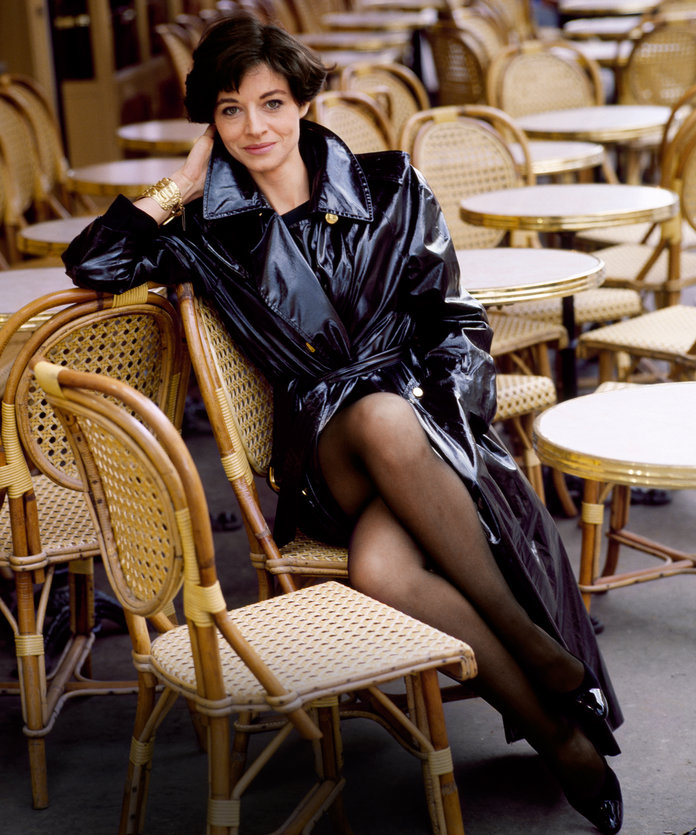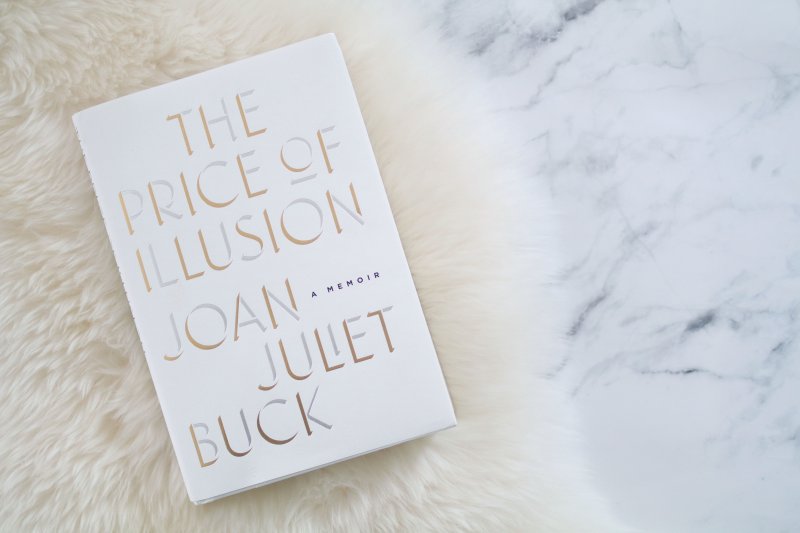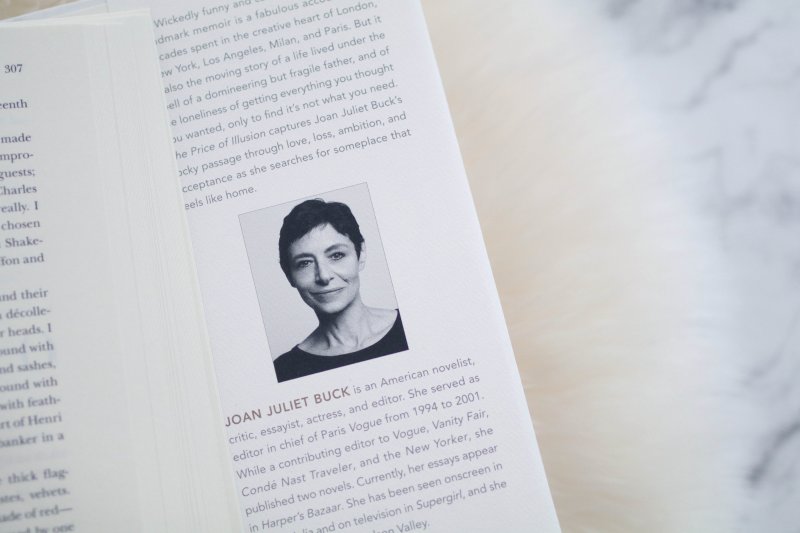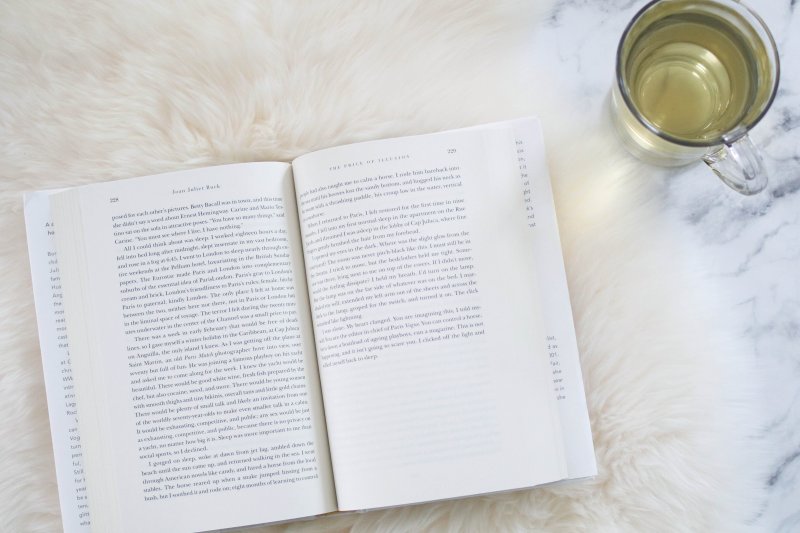
The Price of Illusion by Joan Juliet Buck
I sat down with Joan Juliet’s new book, The Price of Illusion as soon as it hit my doorstep. And as I finished the prologue, completely hooked, I quickly supplied myself with a hot cup of tea and a blanket because I knew I wouldn’t be able to put it down anytime soon. I was entranced with Joan’s world and I wouldn’t be leaving anytime soon.
And who is Joan, you might ask? Joan Juliet Buck is an American novelist, critic, essayist, actress, and editor. She remains the only American editor-in-chief of Paris Vogue, holding the title from 1994-2001 and has also held high positions at Glamour, Women’s Wear Daily, and British Vogue. You may also recognize her from the movie “Julie and Julia”, in which she plays the intimidating Madame Brassart.
Joan’s childhood was a beautiful and extraordinary one filled with her eccentric parents, old Hollywood glamour, and unbelievable experiences in Europe with celebrities such as Peter O’Toole, Anjelica Huston, and Karl Lagerfeld. In her childhood alone, Joan lived what most of us can only dream of experiencing in our entire lives. From It Girl to the very definition of “girl boss”, Joan quickly climbed the fashion industry ranks, settling into a glamorous position and a brilliant career at Paris Vogue. She was beautiful and poised, incredibly intelligent, articulate, and stylish in the way only those citizens of the world can be. And then it all came crashing down around her.
This fall from the top caused Joan to question everything; the price of fame, glamour, and the true cost of a celebrity lifestyle. She stepped away from all that she had known while she searched for the answers. And then she wrote a book, The Price of Illusion; a brutally honest and thought provoking reflection on her life, the fashion industry itself, and the cost at which we pursue fame and success. The book has depth, but it’s not depressing… I found myself laughing aloud at Joan’s sense of humor and impeccable sense of comedic timing as she told tales from the front rows of runways and behind the infamous doors of Vogue. This is a book you will enjoy and cherish from start to finish as you laugh, cry, and question the sacrifices you’re making and vices you possess in your own life.
I found The Price of Illusion to be incredibly relevant to my life as a blogger and for our current social climate. It seems the media’s favorite buzzwords are “reality” and “live” and “real-time” yet so much of this content isn’t actually real. Many millennials are jobless and living with their parents, yet feel the pressure to post endless vacation destination photos to Instagram. And we see hordes of fashion bloggers parading loud and outlandish styles in the hopes of being photographed just once for an online magazine. Are we as a society addicted to perfection and glamour? And what is the cost? I wanted to pick her brain… How do we fight through the superficial to remain genuine and real?
I was so grateful to be given the opportunity to interview Joan about her book, her life, and all the questions I had for her. Even over the phone she possessed a presence; the kind you feel when someone who has experienced and seen everything and has come out even stronger walks into the room. Her husky voice and worldly accent I couldn’t quite place instantly drew me to her; I wanted to be her friend and ask her hours of questions all at the same time. I found her to be grounded, thoughtful, well-spoken, and humorous. She is one of those rare people that comes along once a century or so; someone who lives life to the fullest and then is brave enough to tell the world about it… Good, bad, ugly, and everything in between.
Please read the transcript of my interview with Joan Juliet Buck below. You can purchase her incredible new book here.
Brittany: First of all, I want to thank you for your time and giving me the opportunity to speak with you; it’s an honor. And a big congratulations on your fantastic book. As soon as I began reading, I was blown away by your humor, timing, and story; it’s incredible. I’m excited to be sharing it with everyone.
Joan: People are reacting to the book with their whole hearts; I’m getting this all the time. And the more people there are; I don’t know, we could start a movement!
B: That’s great. First, I wanted to give you a chance to describe the book in your own words and tell people about it.
J: Well, that’s kind of impossible for me. That’s why I had to write a first draft that was over 1,000 pages. It’s a memoir, but it’s about everything.
B: Do you realize that you’re an extraordinary person? Your sense of humor, the access to people and places you’ve been, your experiences. As I was reading through the book, I was wondering,”Does she know she’s an amazing person?” Because that’s what the rest of us are thinking!
J: I had very privileged access all my life; particularly in childhood, particularly growing up. And then it just continued. People describe me as eccentric. I don’t quite know why they say it; I don’t know what that’s about, frankly.
B: Your father, Jules Buck, was a famous film producer. How have his creativity and work had an influence on you and your own work?
J: Interesting question. My dad was very driven; he had a perfect eye for symmetry, for composition, for talent. He knew how to get things done, he was persistent, he never gave up. I don’t have quite as perfect an eye as his; he sometimes doubted my taste. Dad really knew what he wanted and he could tell talent. I think I have that too.
The person who most impressed me when I was at Paris Vogue was a twenty-four-year-old photographer; I think we were the first magazine she worked for. She was called Taryn Simon. She didn’t really want to be taking photographs for Vogue and she’s turned into one of the most important photographers today, but she’s an art photographer. And if you look up ‘Taryn Simon Armory’ you’ll see the amazing show she did that just had a video on The New York Times. She’s a genius. I met this twenty-four-year-old girl I thought, “Yes. You’ve got it.”
The New York Times piece on Taryn Simon.
B: So you have kind of a natural sense for that “it factor”, not to sound too cliché?
J: Well, it’s more real talent. Because “it” is one thing; “it” is the trend, the happening thing right now. Real talent, people have a little bit more trouble with because it’s not always completely digestible. I was a movie critic and I was on the New York Film Festival selection committee where we chose the movies that would be at the festival and awarded them the prize. And… Do you know what it is? Both my parents had extraordinary taste, real discernment about what was good, what was fake, and what was second rate; talent, art, books, movies, theater, actors, directors. They really knew what was truly good. And they imparted that to me. And the big thing was, don’t go for the flim-flam.
B: That’s interesting, what you said about the “it” factor versus real talent or real style, real art. Your book is so relevant to what we’re seeing in society today; the price of illusion and fantasy versus reality. As an influencer, it’s something I struggle with; we’re supposed to create a “perfect” world online. Have you noticed that? And how do you think this sort of illusion will play out over time, both in terms of the influencer industry and on our society as a whole?
J: The whole influencer thing is really interesting because for a long time it was people being photographed going into fashion shows and then it became a phenomenon with people wearing more and more extreme clothes as they’re going into the fashion shows. So it becomes all about what people are wearing to the fashion shows. Here are the designers spending hundreds of thousands of dollars to put on a show and the social media is all photos of the audience, so there’s something wrong there.
Because fashion shows are such a nightmare to live through; you don’t get sleep, you don’t get fed. So when I edited French Vogue I would have a slideshow afterward that would last two days for everybody to take a proper look at what we’d actually seen and try to figure out what’s really happening. And it wouldn’t be the dress that the photographers had all gone crazy about; there would be some underlying thing that was what was really going on.
I think the actresses that I went nuts over when I first saw them were Marion Cotillard and Audrey Tatou who was playing a manicurist in this little movie and I said, “This girl has it.” So I think that for you, your job is to trust your gut reaction; don’t go with what other people are making a fuss about. Go for the thing that makes you feel happy, that excites you, even if you don’t think it’s the thing you should be liking. Because the gut and the instinct are the most important things. So many guys died during the AIDS epidemic; the guys who really had the great instincts, who knew what the good stuff was. And who knew how to recognize beauty and style and grace and gorgeousness.
Now there’s this lemming factor; the internet is all about the lemming factor. If something is on the internet then it has to go on being on the internet. No, it’s your job to really edit and to just choose the stuff you like and stay with it, continue, just keep banging. If you find one thing, one style, one person, keep showing them because you want to not because other people are doing it.
B: The “lemming factor” is such a great term for it! I see it all the time and I think, “This isn’t style… It’s just the quickest, loudest thing you could throw on!” It’s not like these people are trying to create a feeling or imagery or art. So I’m so happy to hear you say that.
You mentioned French Vogue, which was a huge part of your career and from your book, seems to be a major turning point in your life. Can you describe the difficulties beginning there? What was it like being an American in Paris?
J: Well, I grew up in France so I have that French thing. But basically the only way to be an American in Paris is to be there on holiday, sitting at a café table and having a love affair. And to go shopping. But the moment you are part of the French thing, there is this terrible bureaucracy and everything is “non, non, non, non!” – they love saying that, and they love saying “impossible!” So I found myself up against that.
Even though I’m not really American because I grew up in France and England, I found myself getting more American. So I was wearing cowboy boots and practically chewing on straw, just to show that I was kind of a cowgirl and a real American. Because there’s this thing I’m sure you’ve noticed as an influencer, which is the law of contrast. So if you’re around, I don’t know, a bunch of people wearing pink you’re going to wear bright blue because it’s like, enough of this pink – forget it!
B: That’s funny that you say that because I feel like that sometimes. I love romantic, Parisian influences and classic style. And sometimes I feel I accentuate it to stand out against the Kylie Jenner style of the world.
J: Barbie clothes. Oh forget that! You must never mention any of them, not even to comment on them! They don’t exist. Seriously, I was at Women’s Wear Daily when Princess Anne was getting married and I was being given all this shit to find the design for Princess Anne’s wedding dress. And I was getting absolutely nowhere. So I finally said, “The dress is too hideous for us to show. Not interesting!” You know, I wasn’t interested!
You and people in magazines feel a lot of pressure to do what everyone else is doing because that’s what they’re doing. No. The pressure is to really find what really rings your bell. And that’s how you really have an influence.
B: During your time at French Vogue, what did you feel were your driving influences? In your book you mention speaking to French Vogue prior to your becoming editor-in-chief about the changes you thought would help the magazine; were those things your driving forces?
J: I felt it was not an interesting magazine to me when I took it over. I kept saying “je” and “jeu”; I and game in French. I wanted to bring the “I” and “game” back into French Vogue. ‘I’ and the ‘me’ so that the reader would open the magazine and see herself.
In seven years, I only had two movie stars on the cover and I thought, “I’m not doing this again. This is stupid.” The reader wants to see a model really made into today, right now, and then they can relate to the model. But you know, every time we had Kate Moss on the cover I thought it didn’t really talk to the reader because it was a famous model. I was much happier using Carolyn Murphy who wasn’t the household name but who is so beautiful and who could look so many different ways and she was a total trooper too.
B: How would you describe yourself now, at this moment in time? After going through everything you’ve gone through, who is Joan Juliet Buck?
J: I’m a writer and I live the way I want to live. I finally realized I need a lot of sleep; I can’t pretend to be somebody who can survive on six hours of sleep because I can’t. I sleep a lot, I work very hard; I’m reading and writing and acting the whole time. And the last two months I’ve been promoting the book.
But I’m someone for whom human connection; the vulnerability of other people, their truth, their heart, is what interests me the most more than the surface. I’ve always been that way in terms of my friendships. I talk in the book about my friend Lydie who is the mystic poet who is the mave for a priest, who sort of represented the way I wanted my values to be.
Surface – I’m still totally attracted to the beauty, to beautiful things. The beauty of nature, to the beauty of antiquity, to the beauty of all kinds of things. It doesn’t mean I’ve given up on beauty, but I don’t exist to tell people about new products or new actors. I write from my own experience; I write personal essays. I won’t do interviews anymore because I can only tell the truth about myself and I’m most interested in writing about truth.
B: That’s beautiful. Thank you so much, Joan, it was an absolute pleasure.
J: And for me. Thanks! Bye.





